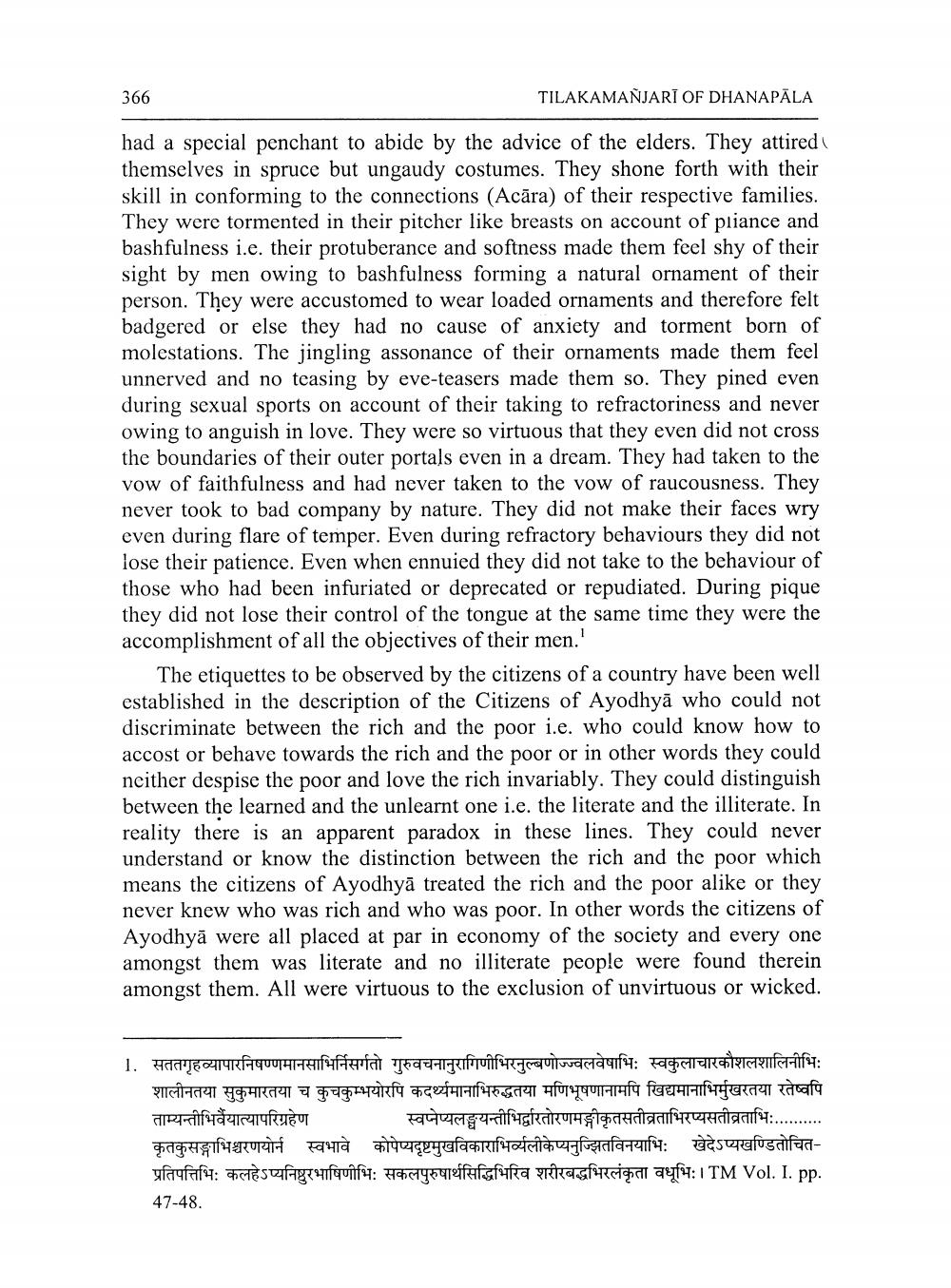________________
366
TILAKAMANJARĪ OF DHANAPĀLA
had a special penchant to abide by the advice of the elders. They attired themselves in spruce but ungaudy costumes. They shone forth with their skill in conforming to the connections (Acāra) of their respective families. They were tormented in their pitcher like breasts on account of pliance and bashfulness i.e. their protuberance and softness made them feel shy of their sight by men owing to bashfulness forming a natural ornament of their person. They were accustomed to wear loaded ornaments and therefore felt badgered or else they had no cause of anxiety and torment born of molestations. The jingling assonance of their ornaments made them feel unnerved and no teasing by eve-teasers made them so. They pined even during sexual sports on account of their taking to refractoriness and never owing to anguish in love. They were so virtuous that they even did not cross the boundaries of their outer portals even in a dream. They had taken to the vow of faithfulness and had never taken to the vow of raucousness. They never took to bad company by nature. They did not make their faces wry even during flare of temper. Even during refractory behaviours they did not lose their patience. Even when ennuied they did not take to the behaviour of those who had been infuriated or deprecated or repudiated. During pique they did not lose their control of the tongue at the same time they were the accomplishment of all the objectives of their men.'
The etiquettes to be observed by the citizens of a country have been well established in the description of the Citizens of Ayodhyā who could not discriminate between the rich and the poor i.e. who could know how to accost or behave towards the rich and the poor or in other words they could neither despise the poor and love the rich invariably. They could distinguish between the learned and the unlearnt one i.e. the literate and the illiterate. In reality there is an apparent paradox in these lines. They could never understand or know the distinction between the rich and the poor which means the citizens of Ayodhyā treated the rich and the poor alike or they never knew who was rich and who was poor. In other words the citizens of Ayodhyā were all placed at par in economy of the society and every one amongst them was literate and no illiterate people were found therein amongst them. All were virtuous to the exclusion of unvirtuous or wicked.
1. सततगृहव्यापारनिषण्णमानसाभिनिसर्गतो गुरुवचनानुरागिणीभिरनुल्बणोज्ज्वलवेषाभिः स्वकुलाचारकौशलशालिनीभिः
शालीनतया सुकुमारतया च कुचकुम्भयोरपि कदीमानाभिरुद्धतया मणिभूषणानामपि खिद्यमानाभिर्मुखरतया रतेष्वपि ताम्यन्तीभिर्वैयात्यापरिग्रहेण
स्वप्नेप्यलङ्घयन्तीभिरतोरणमङ्गीकृतसतीव्रताभिरप्यसतीव्रताभिः...... कृतकसङ्गाभिश्चरणयोर्न स्वभावे कोपेप्यदृष्टमुखविकाराभिर्व्यलीकेप्यनुज्झितविनयाभिः खेदेऽप्यखण्डितोचितufafafar: TÈSufig unfauf: 41459efHffufa praefcipal ayfa: 1 TM Vol. I. pp. 47-48.




